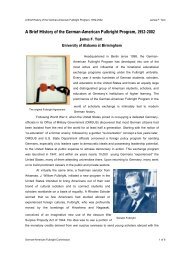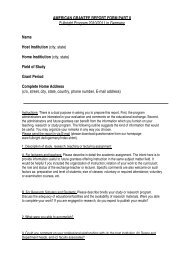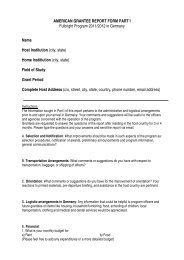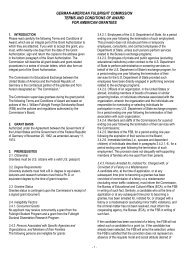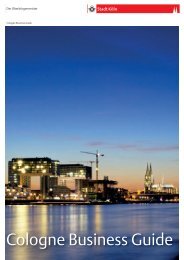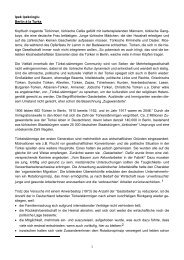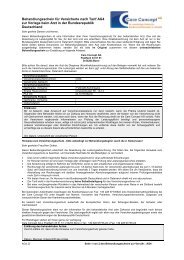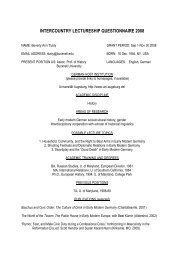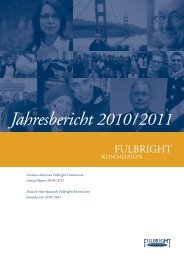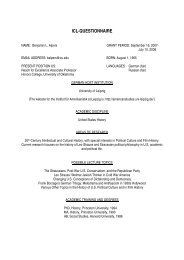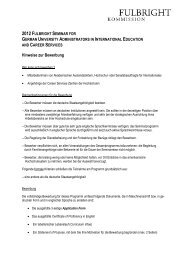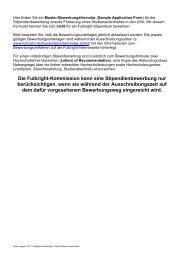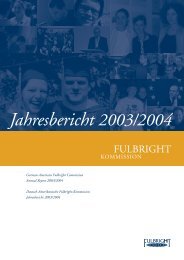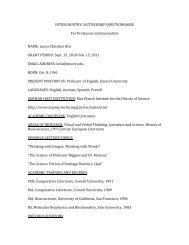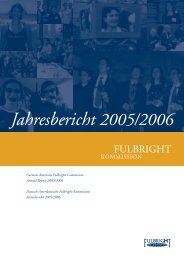The First Class of Fulbrighters - Fulbright-Kommission
The First Class of Fulbrighters - Fulbright-Kommission
The First Class of Fulbrighters - Fulbright-Kommission
Create successful ePaper yourself
Turn your PDF publications into a flip-book with our unique Google optimized e-Paper software.
John B. Payne was born in St. Louis, Missouri, in 1931. He received a B.A. from Texas Christian University<br />
in 1953 before embarking on his <strong>Fulbright</strong> year at the Universität Heidelberg. Upon returning, he<br />
attended Vanderbilt University Divinity School from which he received a bachelor <strong>of</strong> divinity degree in<br />
1956. <strong>The</strong>n he received a Ph.D. from Harvard University in the study <strong>of</strong> religion in 1967. Payne taught<br />
religion at Randolph-Macon Woman’s College (1960-68), and Bradley University (1968-71), and was<br />
pr<strong>of</strong>essor <strong>of</strong> church history at Lancaster <strong>The</strong>ological Seminary (1971-99). His publications include Erasmus:<br />
His <strong>The</strong>ology <strong>of</strong> the Sacraments and the translation and annotation <strong>of</strong> <strong>The</strong> Paraphrases on Romans<br />
and Galatians and <strong>The</strong> Annotations on Romans in <strong>The</strong> Collected Works <strong>of</strong> Erasmus. He is the editor <strong>of</strong><br />
Reformation Roots. Payne is ordained with dual ministerial standing in the United Church <strong>of</strong> Christ and<br />
the Christian Church (Disciples <strong>of</strong> Christ). He and his wife Nancy have three adult children.<br />
Memories <strong>of</strong><br />
My <strong>Fulbright</strong> Year<br />
by John B. Payne<br />
MY YEAR AS A FULBRIGHTER at the beginning <strong>of</strong><br />
the German program in 1953-54 was most memorable and<br />
influential upon my life. It began with a seven-day voyage<br />
with all the other <strong><strong>Fulbright</strong>ers</strong> on the S.S. Independence from<br />
New York via Lisbon and Gibraltar to Genoa and then a<br />
trip by train through the Alps to Bad Honnef am Rhein<br />
for a three-week orientation session before we departed for<br />
our respective universities.<br />
Several <strong>of</strong> us, who had not received tourist-class dining<br />
room tickets when we boarded, lucked out. We were<br />
bumped up to the cabin-class dining room. I remember<br />
with delight the animated conversation at every meal,<br />
although I must confess that I missed some breakfasts<br />
because I stayed up so late talking or playing bridge or<br />
singing German songs with other <strong><strong>Fulbright</strong>ers</strong>. I remember<br />
the excitement, the heightened state <strong>of</strong> anticipation,<br />
the camaraderie as we journeyed together toward a foreign<br />
land. My only prior experience in a foreign country was a<br />
trip to Canada as a teenager. I suspect this very limited<br />
exposure to another culture was true <strong>of</strong> most <strong>of</strong> the other<br />
<strong><strong>Fulbright</strong>ers</strong> as well.<br />
<strong>The</strong>re was some anxiety about the language—whether,<br />
when we reached our respective destinations, we would be<br />
able to speak and understand German well enough to get<br />
along. Some modest efforts at trying out the language were<br />
made on the trip, but it was not until we reached German<br />
soil in Bad Honnef that those efforts began in earnest.<br />
<strong>The</strong>re, my roommate, Bill Bader, and I contracted to speak<br />
only German with one another, a contract to which we did<br />
not entirely adhere. Most <strong>of</strong> us knew that we needed much<br />
improvement in language skills. Fortunately, I had received<br />
a solid grammatical foundation in college and was rather<br />
confident that with sufficient practice the speaking and the<br />
understanding would come along. And that proved to be<br />
the case.<br />
I remember being favorably impressed by the friendliness<br />
and hospitality <strong>of</strong> the German people already in Bad<br />
Honnef—the management and waiters <strong>of</strong> the Hotel Klein;<br />
the citizens <strong>of</strong> the town; the mayor <strong>of</strong> Cochem an der<br />
Mosel, who greeted us on our bus tour <strong>of</strong> the Rhine and<br />
Mosel Valley; a pastor in Bad Honnef who invited several<br />
<strong>of</strong> the theological students to his house for c<strong>of</strong>fee and conversation;<br />
and a student from Heidelberg who <strong>of</strong>fered his<br />
help in finding living quarters there.<br />
For me, the supreme illustration <strong>of</strong> hospitality was that<br />
<strong>of</strong> the Familie Lauer, with whom I lived during my entire<br />
period <strong>of</strong> study in Heidelberg. <strong>The</strong>y were a working-class<br />
family who lived in a modest house on the outskirts <strong>of</strong><br />
Heidelberg in Pfaffengrund. <strong>The</strong>y took me in with open<br />
arms. Frau Lauer in particular cared for my every need,<br />
including nursing me when I contracted the flu in winter<br />
and a kidney stone in summer. Fifteen years later my family<br />
and I made a visit to Heidelberg in order to attend the<br />
Stiftungsfest <strong>of</strong> the Heidelberger Kreis, to which I had<br />
belonged during the latter half <strong>of</strong> my academic year. We<br />
stayed with the Lauers, and Frau Lauer cared for the children<br />
so that my wife and I could take part in events <strong>of</strong> the<br />
Fest, the ball in the Schwetzingen Schloss and the boat trip<br />
on the Neckar.<br />
<strong>The</strong> Heidelberger Kreis, “eine Verbindung, die keine schlagende<br />
war,” 1 afforded me another memorable experience <strong>of</strong><br />
hospitality as I was warmly received at the meetings and<br />
social events by the members who called me “Bürger<br />
Payne.” That the original Citizen Paine’s 2 name was spelled<br />
differently, didn’t matter. <strong>The</strong> meetings, with their lectures<br />
and discussions on such topics as the justification for the<br />
attempted assassination <strong>of</strong> Hitler on July 20, 1944, provided<br />
much intellectual stimulation.<br />
Even more stimulation and learning took place, however,<br />
in the lectures and seminars <strong>of</strong> the University <strong>of</strong> Heidelberg,<br />
whose theological and philosophical faculties were<br />
perhaps, then, at their apex. I was delighted to hear and<br />
try to understand the lectures by such prominent scholars<br />
and thinkers from the theological faculty such as Gerhard<br />
von Rad, Günther Bornkamm, Heinrich Bornkamm and<br />
Edmund Schlink and, on the philosophical faculty, Karl<br />
Löwith and Hans-Georg Gadamer.<br />
One <strong>of</strong> the most outstanding learning experiences <strong>of</strong><br />
the year was the time in Berlin, to which we traveled in<br />
June by military train from Frankfurt. We had the oppor-



